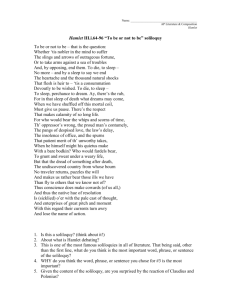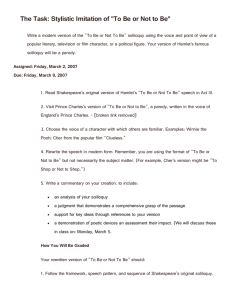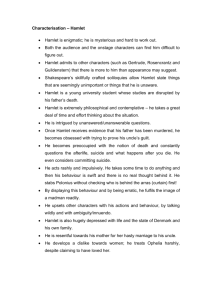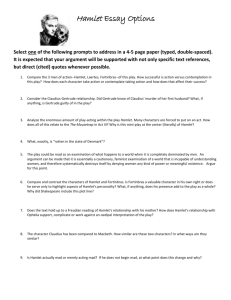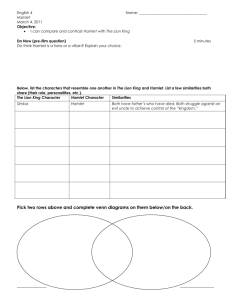HOMEWORK Hamlet`s soliloquy begins with what is considered to
advertisement
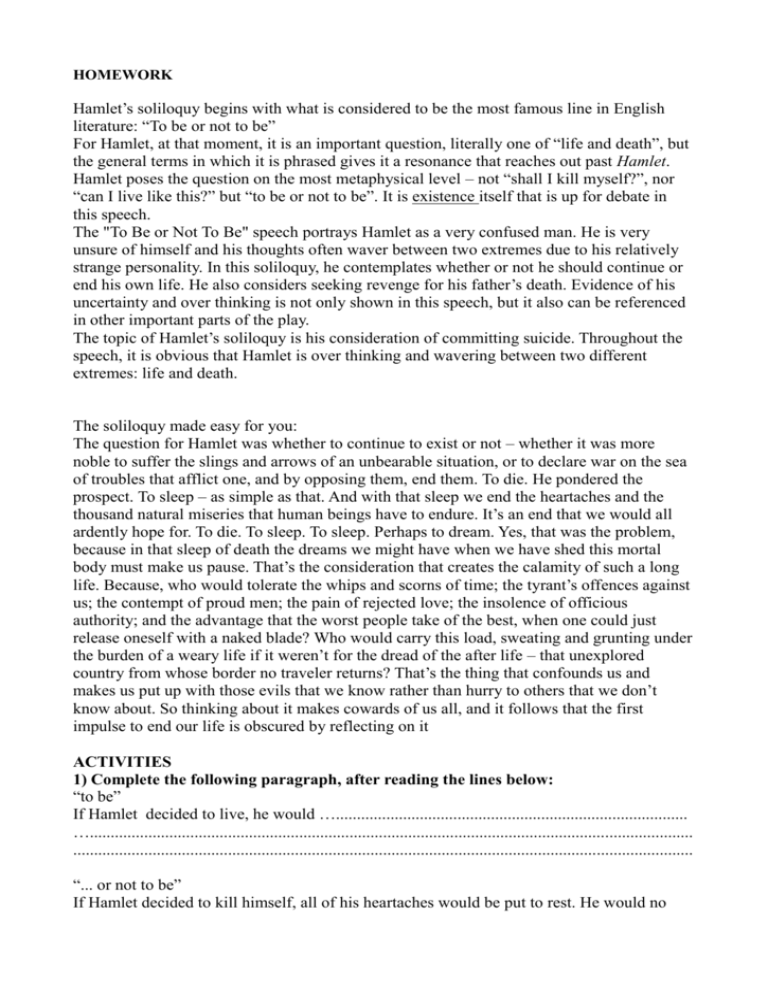
HOMEWORK Hamlet’s soliloquy begins with what is considered to be the most famous line in English literature: “To be or not to be” For Hamlet, at that moment, it is an important question, literally one of “life and death”, but the general terms in which it is phrased gives it a resonance that reaches out past Hamlet. Hamlet poses the question on the most metaphysical level – not “shall I kill myself?”, nor “can I live like this?” but “to be or not to be”. It is existence itself that is up for debate in this speech. The "To Be or Not To Be" speech portrays Hamlet as a very confused man. He is very unsure of himself and his thoughts often waver between two extremes due to his relatively strange personality. In this soliloquy, he contemplates whether or not he should continue or end his own life. He also considers seeking revenge for his father’s death. Evidence of his uncertainty and over thinking is not only shown in this speech, but it also can be referenced in other important parts of the play. The topic of Hamlet’s soliloquy is his consideration of committing suicide. Throughout the speech, it is obvious that Hamlet is over thinking and wavering between two different extremes: life and death. The soliloquy made easy for you: The question for Hamlet was whether to continue to exist or not – whether it was more noble to suffer the slings and arrows of an unbearable situation, or to declare war on the sea of troubles that afflict one, and by opposing them, end them. To die. He pondered the prospect. To sleep – as simple as that. And with that sleep we end the heartaches and the thousand natural miseries that human beings have to endure. It’s an end that we would all ardently hope for. To die. To sleep. To sleep. Perhaps to dream. Yes, that was the problem, because in that sleep of death the dreams we might have when we have shed this mortal body must make us pause. That’s the consideration that creates the calamity of such a long life. Because, who would tolerate the whips and scorns of time; the tyrant’s offences against us; the contempt of proud men; the pain of rejected love; the insolence of officious authority; and the advantage that the worst people take of the best, when one could just release oneself with a naked blade? Who would carry this load, sweating and grunting under the burden of a weary life if it weren’t for the dread of the after life – that unexplored country from whose border no traveler returns? That’s the thing that confounds us and makes us put up with those evils that we know rather than hurry to others that we don’t know about. So thinking about it makes cowards of us all, and it follows that the first impulse to end our life is obscured by reflecting on it ACTIVITIES 1) Complete the following paragraph, after reading the lines below: “to be” If Hamlet decided to live, he would ….................................................................................... …................................................................................................................................................ .................................................................................................................................................... “... or not to be” If Hamlet decided to kill himself, all of his heartaches would be put to rest. He would no longer have to watch his uncle reign over the kingdom that he believes should belong to him and his father. He would no longer have to feel obligated to revenge his father. 2) Hamlet talks about various things that make life difficult. For example, he mentions ‘the oppressor’s wrong’. Can you give a “modern” example of this? ….......................................................................................................................................... 3) Can you match these to the following examples with Hamlet’s descriptions? A - Your arrogant friend never treats you with respect B - You feel old C - The flowers you send to someone you like are returned D - Your legal case takes years to be decided E - You are always nice to someone who treats you badly F - Your boss is rude to you all the time 1. The whips and scorns of time 2. The proud man's contumely 3. The pangs of despised love 4. The law's delay 5. The insolence of office 6. The spurns that patient merit of the unworthy takes 4) What is the prevailing rhetorical figure used in this soliloquy? …......................................................................................................................................................

